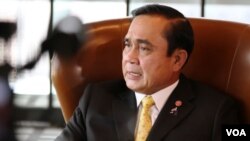ບັນດາຜູ້ຕິຕຽນ ລັດຖະບານທະຫານໄທ ຍັງພາກັນສະແດງ
ຄວາມສົງໄສ ກ່ຽວກັບຄຳໝັ້ນສັນຍາ ທີ່ໄດ້ໃຫ້ໄວ້ ໂດຍຜູ້ນຳ
ລັດຖະບານທະຫານໃນລະຫວ່າງການໃຫ້ສຳພາດກັບວີໂອ
ເອ.
ທ່ານປຣະຍຸດ ຈັນໂອຊາ ນາຍພົນ ຊຶ່ງໃນປັດຈຸບັນນີ້ ໄດ້ອອກ
ກິນເບ້ຍບຳນານແລ້ວ ທີ່ໄດ້ຂັບໄລ່ລັດຖະບານພົນລະເຮືອນ
ໃນການເຮັດລັດຖະປະຫານ ທີ່ບໍ່ມີ ການນອງເລືອດນັ້ນ ກ່າວ
ວ່າ “ປະຊາທິປະໄຕໃນໄທຍັງຕ້ອງການໆປັບປຸງບາງສິ່ງບາງ
ຢ່າງ ບໍ່ວ່າຈະເປັນໃນດ້ານລັດຖະທຳມະນູນ ການເລືອກຕັ້ງ
ຂັ້ນຕອນໃນການເລືອກຕັ້ງ ແລະໂດຍສະເພາະໃນດ້ານການ
ຄຸ້ມຄອງ ແລະບັນດານັກການເມືອງ ພາກັນເຂົ້າມາຫລິ້ນການເມືອງຢ່າງໃດ”.
ທ່ານ Sean Boonpracong ອະດີດທີ່ປຶກສາດ້ານຄວາມປອດໄພແຫ່ງຊາດ ຂອງລັດ
ຖະບານ ທີ່ໄດ້ຖືກໂຄ່ນລົ້ມ ໃນເດືອນພຶດສະພາ ປີ 2014 ດ້ວຍການເຮັດລັດຖະປະຫານ
ນັ້ນ ກ່າວວ່າ. “ນັບແຕ່ທ່ານໄດ້ເຂົ້າຄວບຄຸມລັດຖະບານໄດ້ມີ 700 ຖືກຈັບຍ້ອນຕິຕຽນ
ລັດຖະບານທະຫານ ເພາະສະນັ້ນ ຈຶ່ງບໍ່ແມ່ນການ ປັບປຸງຫຍັງເລີຍ. ສະຖານະການດ້ານ
ສິດທິມະນຸດແມ່ນຈະແຈ້ງຂີ້ຮ້າຍລົງກວ່າເກົ່າ ບໍ່ວ່າໂດຍມາດຕະຖານໃດໆ ໃນໄລຍະ 70
ປີຂອງລະບອບປະຊາທິປະໄຕ ທີ່ເປັນປະເພນີປະຕິບັດກັນມາຢູ່ໄທ.”
ໃນການສຳພາດເປັນການພິເສດກັບ ວີໂອເອ ໃນວັນອັງຄານວານນີ້ ທີ່ນະຄອນ New
York ບ່ອນທີ່ທ່ານໄດ້ເຂົ້າຮ່ວມ ກອງປະຊຸມສະມັດຊາໃຫຍ່ ສະຫະປະຊາຊາດ ນາຍົກ
ລັດຖະມົນຕີໄທ ກ່າວວ່າ “ປະຊາຊົນພາກັນຕື່ນຕົກໃຈ” ທີ່ລັດ ຖະບານທະຫານ ໄດ້ຕໍ່
ເວລາໃນການກຳອຳນາດອອກໄປ ຢ່າງນ້ອຍຈົນຮອດ ກາງປີ 2017.
ທ່ານປຣະຍຸດ ໄດ້ກ່າວວ່າ “ຂ້າພະເຈົ້າ ບໍ່ໄດ້ຕໍ່ເວລາຂອງຂັ້ນຕອນນີ້ອອກໄປ. ຖ້າຫາກວ່າ
ມັນເຄື່ອນໄຫວໄດ້ໄວຂື້ນກວ່ານີ້ ມັນກໍສົມຄວນ.” “ແຕ່ພວກເຮົາຄວນ ມອງເບິ່ງວ່າ ມັນຈະ
ນຳໄປສູ່ສັນຕິພາບ ໄດ້ຫລືບໍ່?”
Critics of Thailand's military government are expressing skepticism about promises made by the junta leader during a VOA interview.
"Thai democracy still needs some fine-tuning, whether it is for the constitution, election, election process and especially governance and how politicians get into politics," said Prayuth Chan-ocha, the now-retired general who ousted the civilian government in a bloodless coup.
"Since he took control of this government there has been over 700 'attitude adjustments' (interrogations of temporarily detained junta critics) so that's not 'fine tuning,'" said Sean Boonpracong, the former national security advisor from the government ousted in the May, 2014 coup."The human rights situation has clearly worsened by any standard of 70 years' democracy Thailand has been accustomed to."
In a VOA exclusive interview Tuesday in New York, where he is attending the United Nations General Assembly, the Thai prime minister said "people are alarmed" the military government has extended its time in power until at least mid-2017.
"I didn't extend the process. If it can move faster, it should," Prayuth said. "But we should look [at] whether it will lead to peace."
Moving Toward or Away From Democracy?
Thailand's military government has repeatedly justified its suspension of democracy as a plan to create a political system that is not paralyzed by the sometimes violent standoffs between opposing political camps that have repeatedly erupted in recent years.
But the government's ban on political gatherings, detention of critics and threats against the news media are moving the country further away from democratic principles, said Pravit Rojanaphruk, a former columnist for Thailand's Nation newspaper. "The political ground isn't exactly being prepared for a return to democracy as more widespread crackdown on dissents and suppression of freedom to criticize the military regime are taking place."
Prayuth has banned public protests, saying that minimizes "provocation of conflict and unrest." But he denied he has further clamped down on freedom of expression in Thailand.
"I'm telling you that I have exercised my power only minimally," Prayuth told VOA.
That assertion was rebutted Wednesday in Thailand by junta detractors.
"It's quite clear that there is an ongoing campaign of repression that is certainly being felt, not only in Bangkok but out in the provinces," said Phil Robertson, the Asia division deputy director of Human Rights Watch. "It's interesting that General Prayuth is trying to downplay that when he's overseas, but when he's back here in Thailand it's a completely different line that he's taking."
Former Nation columnist Pravit, twice detained for "attitude adjustment" by authorities since the coup, predicted that "more detentions without charge, more threats against the mass media and dissidents will not bring about democracy, but the opposite."
The military government is also considering restricting Thailand's internet to a single access point, sparking fears of a Chinese-style firewall to block content that officials find objectionable.
"How can this be for democracy?" asked Pravit, speaking to VOA on his last day at the Nation newspaper after 23 years.
His employer and colleagues had faced enormous pressure as a result of his second detention this month by the junta for his outspoken comments.
Curbing Human Trafficking
Prayuth, in his interview with VOA, also vowed to continue to fight human trafficking, saying, "the past governments didn't give it much attention. They may have thought it was OK."
The U.S. State Department, in its annual report ((http://www.state.gov/j/tip/rls/tiprpt/countries/2015/243547.htm )) on global trafficking earlier this year, assessed Thailand as "a source, destination and transit country" for forced labor and sex trafficking, with the latter remaining "a significant problem."
Trafficking victims include some of the estimated three to four million migrant workers in Thailand, who are "exploited in commercial fishing" and related industries, as well as factories and domestic work, the report said.
Prayuth said he needs time "to think about how to deal" with undocumented migrant workers, acknowledging Thailand "broke the rules" set by international organizations.
"These people have been illegal for decades," he added.
The junta sees migrant workers as a security threat, according to Robertson at Human Rights Watch.
"That is the traditional outlook of the security forces in Thailand viewing Burmese and Cambodian workers as a necessary evil for Thai industry but something they're not terribly happy about," said Robertson.
Thailand needs to ensure freedom of movement for such workers and the right to change jobs so they can escape abusive employers, he added.
Additional reporting by Songphot Suphaphon in New York, Carol Guensburg and Rattaphol Onsanit in Washington DC




